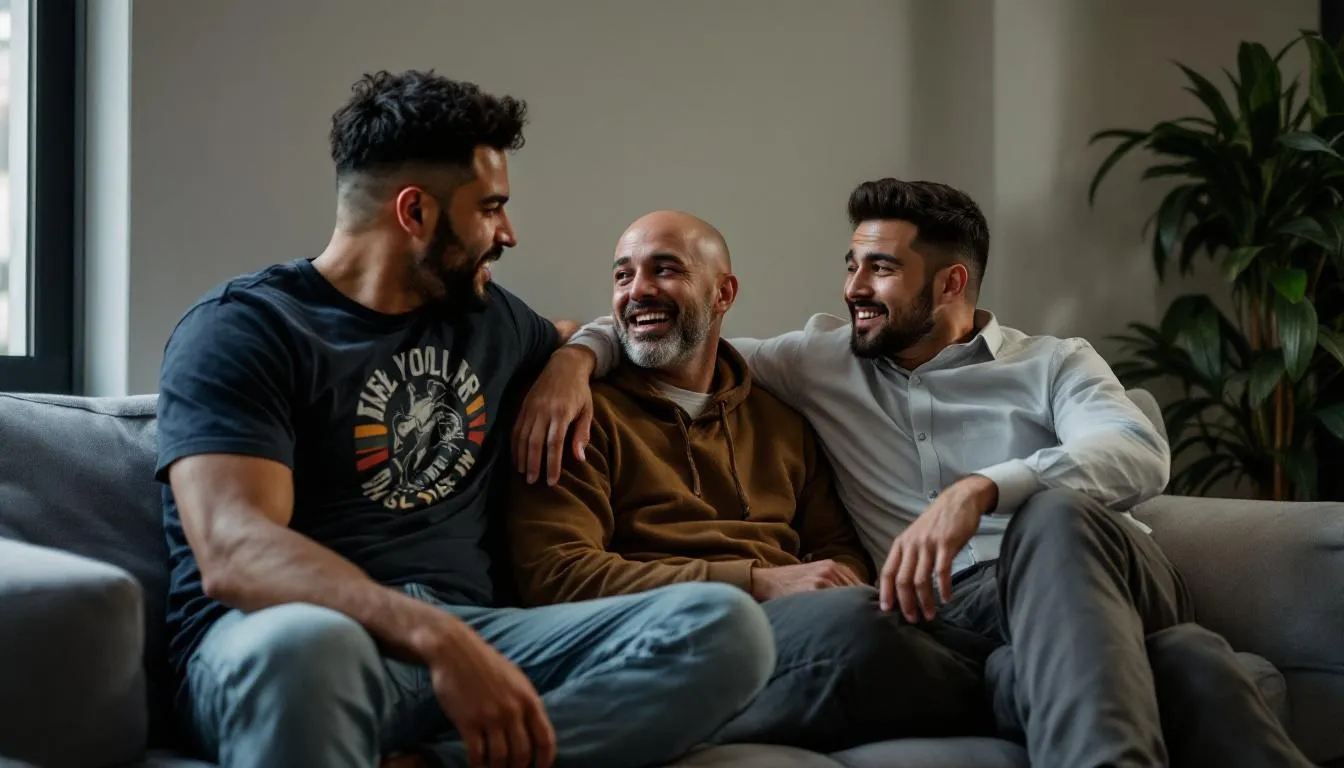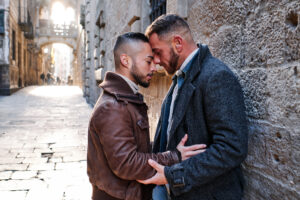The confession happened on a Tuesday night in their Chelsea apartment. Daniel’s voice shook as he told Ahmad and Oliver the truth he’d been hiding for months: he was falling in love with both of them. The silence that followed felt endless. Then Oliver reached for his hand. Ahmad moved closer. What Daniel feared would destroy everything instead became the foundation of the most authentic relationship any of them had ever experienced. It was time for gay throuple therapy in NYC.
Three years later, their throuple continues to thrive in ways that surprise even them. They’ve weathered jealousy storms, navigated family holidays with three boyfriends, and built something that defies every relationship rule they grew up believing. Their story echoes through coffee shops in Hell’s Kitchen, dinner parties in Brooklyn Heights, and therapy sessions across Manhattan where other gay men are discovering that love multiplies rather than divides.
You know that feeling when your heart pulls you toward someone new, even though you’re already committed? When traditional relationship advice feels completely irrelevant to your actual experience? If you’re navigating the complex world of three-person relationships, you’re not alone. Gay throuple therapy includes stories that reveal both the incredible rewards and significant challenges of polyamorous relationships. From managing jealousy and time to celebrating anniversaries with two boyfriends, these real experiences offer insights that can transform your understanding of what’s possible.
This guide shares authentic gay throuple stories that matter. The successes, struggles, and everything in between. You’ll discover practical rules for managing three-way dynamics, learn from both triumphant and challenging experiences, and understand how schema therapy can help your throuple thrive. Most importantly, you’ll find hope and expert support right here in NYC.
Key Insights About Gay Throuple Therapy in NYC
- Success requires intentional structure: Thriving throuples establish clear communication rhythms, rotating date nights, and explicit boundaries rather than hoping things work out naturally
- Schema therapy transforms common struggles: Understanding emotional “modes” like jealousy patterns and withdrawal behaviors helps partners respond skillfully instead of reactively during conflicts
- NYC offers specialized support: Licensed therapists at Loving at Your Best, like Jon Prezant, provide expert guidance specifically for gay throuples navigating complex three-person dynamics
- Real relationships face real challenges: From family acceptance to legal limitations, successful throuples develop practical strategies for external pressures while building internal strength

What Are Gay Throuple Relationships?
You’re scrolling through dating apps, feeling that familiar emptiness even when you match with someone attractive. Meanwhile, your current relationship feels solid but somehow incomplete. Something’s missing, but you can’t name it.
A gay throuple relationship involves three men who share romantic, emotional, and typically sexual bonds with each other. Unlike casual threesome encounters or one-night hookups, throuple relationships center on authentic emotional connections. They focus on shared life responsibilities and long-term commitment between all three people.
Your heart knows the difference. Understanding this distinction becomes crucial for anyone considering this path.
How Gay Throuples Differ from Casual Sexual Encounters
Saturday morning in Brooklyn. Three coffee cups on the kitchen counter. Someone’s making eggs while another folds laundry. The third person is planning their shared grocery run for the week. This isn’t a hookup that lasted too long.
The difference between a throuple and casual sex runs deeper than most realize. Threesome experiences might happen once or occasionally. However, throuple relationships involve the same three people building a life together. They share date nights, split household expenses, make decisions as a unit. Often they live in the same house or maintain connected living arrangements.
Many gay throuple relationship stories begin when a couple invites a third person into their bed. Then deeper feelings develop. What started as sexual exploration evolves into something more meaningful. All three men recognize they’ve formed genuine bonds worth nurturing.

When Casual Becomes Committed
Marcus’s voice still carries wonder when he talks about his transformation. “We thought we were just having fun. But when David started staying for breakfast, then helping with grocery shopping, then being the person we called when we had good news to share… we realized this wasn’t just physical anymore. We were becoming a family.”
Recognizing when casual becomes committed often catches people off guard.
Evolution from Dating Couples to Committed Relationships
You know how it starts. Your boyfriend mentions that cute guy from the gym again. The one who keeps showing up in conversations. Maybe you’ve all hung out a few times, and something feels different about the dynamic.
The journey from two partners to three rarely follows a script, but patterns emerge. Sometimes a boyfriend develops feelings for a mutual friend. This sparks honest conversations about expanding the relationship. Other couples find themselves repeatedly inviting the same person over for what started as casual fun.
Marcus watched this evolution happen in real time with Ben and David. “We kept telling ourselves it was just physical,” he explains. “But then David started staying for Sunday brunch. He had opinions about our apartment hunt. When Ben got promoted, David was the second person we called.” After two years of gradual integration, they faced the truth. They weren’t just having great sex anymore. They were building a life together.
Open vs. Closed Gay Throuple Structures
Every throuple faces the same fundamental question: do we keep this between the three of us, or do we allow outside connections?
Closed throuples create sexual and romantic exclusivity among the three men. All intimate connections happen within the triad. Think of it as a traditional monogamous relationship, but with three people instead of two.
Open relationships allow members to pursue connections outside the core group. But this freedom comes with complexity. Extensive communication becomes essential. Boundaries need clear definition. All three partners must genuinely agree on the rules.
Most couples assume they know which structure they want, but reality often surprises them. Many throuples start closed and gradually negotiate opening. Others begin with openness but discover they prefer the intimacy of a closed arrangement. The choice depends on your jealousy tolerance, communication skills, and honest assessment of what each person actually needs.
Legal Recognition Challenges and Breakthrough Cases
The law hasn’t caught up with love. Most U.S. jurisdictions refuse to recognize three-person marriages. This creates real problems around custody, inheritance, and medical decisions. When one partner ends up in the hospital, the third person might find themselves legally powerless to help.
But change is happening. In 2023, Macon County, Georgia granted legal parental rights to a gay throuple. The breakthrough marked significant progress in recognizing polyamorous family structures. Still, these victories remain rare exceptions rather than the rule.
For throuples raising children or managing shared assets, creativity becomes necessary. Domestic partnership agreements, detailed wills, and medical directives provide some protection. Yet full legal equality remains frustratingly out of reach. This reality makes having strong relationships even more crucial, since legal protections can’t always fill the gaps.

Real Gay Throuple Relationship Stories: Gay Throuple Therapy NYC
You’ve heard the theory. Now you need to see how this actually works in real life. Because while every relationship is different, certain patterns emerge when three people commit to building something lasting together.
Success Stories That Inspire
Que Brown, Tye Brown, and Martel Star live their truth loudly. Based in Atlanta, these three men have become one of the most visible Black gay triads in the community. They don’t hide their relationship or downplay their commitment. Instead, they showcase the power of mutual support, shared values, and community advocacy.
Watch them on social media and you’ll see what authentic throuple life looks like. They celebrate milestones together, support each other’s careers, and maintain strong extended family relationships. Their openness about their family life has helped normalize throuple relationships. More importantly, they’ve provided representation for other gay men considering similar arrangements.
Their story proves something crucial: successful gay throuple relationships require the same foundation as any partnership. Trust, communication, and shared vision for the future matter more than the number of people involved.
Building a Family with Three Parents
Mitch, Ben, and Benjamin faced a different challenge. They wanted children, but society wasn’t designed for three-parent families. So they created their own blueprint.
This married throuple adopted a daughter and built something remarkable: a stable home environment with three fully engaged parents. Their household operates with shift-based childcare. Better sleep schedules for everyone. More attention for their child. Less burnout for each parent.
The parenting arrangement works because they’ve divided responsibilities based on strengths rather than forcing equality. One partner serves as the playful parent. Another focuses on nurturing and emotional support. The third handles practical matters like schedules and discipline. This division creates a robust support system that benefits both parents and child.
But it required intentional design. They couldn’t just wing it and hope three people would naturally figure out how to parent together.
When Love Triangles Become Love Triads
You know that sinking feeling when your partner admits they have feelings for someone else. Jake felt it too when his boyfriend of two years confessed his attraction to their mutual friend Chris. Most people would demand a choice. Jake chose a different path.
Instead of forcing an ultimatum, Jake suggested something radical: what if they explored whether a three-person relationship might work for everyone? The idea terrified him, but losing his boyfriend to secrecy felt worse.
Months of careful communication followed. Gradual boundary expansion. Honest conversations about fears and needs. The three men discovered something unexpected: they could all love and support each other without diminishing anyone’s connection.
The breakthrough came when Jake realized the key insight. No one needed to feel replaced or secondary. Each pair within the triad could maintain their unique bond while building new connections. Jake and his original boyfriend preserved their special history. Meanwhile, new relationships with Chris developed organically.
When Work Gets in the Way
Not all gay throuple stories unfold smoothly. Michael learned this the hard way when workplace romance complicated everything.
As a task supervisor who became involved with two subordinates, Michael faced company policies that prohibited fraternization. The relationship required secrecy, which strained their connection from the start. Hiding their bond at work felt exhausting. Power dynamics created additional tension. Fear of professional consequences loomed constantly.
The stress became unbearable. Eventually, one partner transferred to a different department. Only then could their relationship continue more openly. Michael’s experience shows how external pressures and institutional barriers can impact throuple success.
The Accidental Throuple
Tony, Rick, and James met through a dating app with zero intention of forming a relationship. They planned just one threesome experience. But their chemistry surprised everyone, especially them.
Six months later, they faced an unexpected realization. They were talking daily. Making plans together beyond sex. Genuinely caring about each other’s lives. What began as purely physical had evolved into emotional investment.
They decided to formalize their relationship. Four years later, they’re still together. Sometimes the best relationships happen when you’re not trying to force them.
Successful Long-Term Gay Throuple Stories from Gay Throuple Therapy NYC
Reading about successful relationships feels different when you’re struggling with your own dynamics. But these stories matter because they show what’s possible when three people commit to doing the work.
Daniel, Ahmad, and Oliver’s Three-Year Journey
Daniel, Ahmad, and Oliver had already faced what many throuples fear: the moment one partner risks breaking the balance by asking for something more. That early, vulnerable confession — when Daniel admitted his feelings to both men — didn’t end their relationship. It deepened it.
Their continued success comes from structure, not luck. They rotate one-on-one date nights for balance and schedule weekly three-way check-ins. They openly revisit time allocation when anyone feels slighted. When jealousy shows up — and it sometimes still does — they treat it as relationship intel, not a crisis.
“We’ve never ignored jealousy,” Daniel says. “It’s just a signal. When someone speaks up, the others listen.”
Their triad is built not just on chemistry or compatibility, but on systems they’ve committed to maintaining — even on days when it’s hard.
Eight Years and Still Going Strong
Martel’s triad just celebrated something most couples never reach: their eighth anniversary. But this wasn’t your typical anniversary dinner. They held a commitment ceremony that honored all three relationships within their throuple.
The most powerful moment? Family members who had initially struggled to understand their arrangement stood up to offer toasts. Parents who once worried about their “phase” now fully support their unconventional family. Eight years of consistency had changed minds that seemed impossible to reach.
Their longevity didn’t happen by accident. When you ask Martel what keeps three people together for nearly a decade, he points to four non-negotiables:
Regular relationship counseling with a therapist familiar with polyamorous relationships. They don’t wait for crises. They invest in professional support before problems escalate.
Annual relationship retreats where they assess goals and challenges. Every year, they get away together to evaluate what’s working and what needs adjustment.
Financial transparency with shared budgeting and individual discretionary funds. Money fights kill relationships. They eliminated the mystery by making everything visible.
Maintaining friendships outside the throuple to prevent isolation. They refuse to become a closed system. Outside friendships keep them connected to the broader community.
Notice what’s missing from that list? Lucky breaks. Perfect compatibility. Easy personalities. Instead, Martel’s triad succeeds through intentional systems and professional support.
The Power of Community Support
Walk into any polyamorous meetup in Brooklyn or the Village, and you’ll hear similar stories. Committed family units who’ve discovered that gay throuple relationships can provide something traditional couples often lack: built-in resilience.
These families describe experiences that sound almost too good to be true. Group resilience during crises. Creative problem-solving that comes from three perspectives instead of two. A powerful sense of chosen family that supports each member’s individual development.
But the most compelling benefit might be what community members call “emotional redundancy.” When one person is struggling with work stress, family drama, or health issues, the other two can offer support without overwhelming any single individual.
Think about the last time your partner went through a difficult period. You probably felt pressure to be everything they needed while managing your own stress. Now imagine sharing that load with another person who cares just as deeply.
This dynamic creates sustainability that helps relationships weather difficult periods. Instead of burning out one person with caregiving responsibilities, the support gets distributed. Even when life gets messy, a well-supported triad absorbs the impact instead of cracking under pressure.

Challenging Gay Throuple Experiences
But let’s be honest about something. Not every throuple story ends with anniversary celebrations and family acceptance. Some end with heartbreak that cuts deeper than any traditional breakup you’ve experienced.
Being Excluded After Years of Commitment
James thought he was building a life with two people who loved him. Two years of shared finances, joint decisions, and future planning. Then one Tuesday evening, his partners sat him down for “a conversation.”
They wanted a traditional marriage. Just the two of them. James could remain a friend, of course. But the romantic relationship? That needed to end.
Two years of his life. Gone in one conversation. Despite building everything together, he found himself suddenly excluded from the relationship he’d helped create. The worst part? They seemed genuinely surprised that he felt devastated.
James learned something brutal about throuple relationships: unequal commitment levels can destroy everything. When two partners decide they want something the third person can’t provide, the result devastates everyone involved. But especially the person being asked to leave.
“I realized we’d never actually talked about our long-term goals,” James reflects. “We assumed we all wanted the same things, but we never checked. That assumption almost destroyed me.”
Now James advocates for written agreements that protect all parties. Clear processes for addressing major relationship changes. Regular check-ins about long-term goals. Because love isn’t enough when people want fundamentally different futures.
When Family Faith Collides with Love
Marcus knew the phone call to his parents wouldn’t be easy. Coming out as gay had taken years to navigate. But explaining that he was now in a relationship with two men? That conversation felt impossible.
His religious family struggled with both his sexual orientation and non-monogamous relationship structure. Holiday plans became minefields. Family gatherings turned into interrogations. Some relatives stopped speaking to him entirely. The stress of managing family disapproval while trying to maintain his relationship with David and Steven required constant emotional labor.
“I felt like I was living three different lives,” Marcus explains. “The person I was with my partners, the person I became around my family, and the exhausted person trying to hold it all together.”
They learned to present a united front while allowing individual family relationships to develop at different paces. Marcus’s parents needed time to process. David’s family embraced the relationship quickly. Steven’s family fell somewhere in between.
Eventually, Marcus’s parents began accepting the relationship. But full acceptance took several years of patience, consistent boundaries, and proving that their unconventional family was still a loving one. Some family members never came around. Marcus had to make peace with that reality.
The experience taught them that family acceptance often comes in waves rather than sudden revelations. You can’t force understanding, but you can model the love you want them to see.
When Trust Breaks Everything
Ryan’s text came at 2 AM: “We need to talk. All of us. Tomorrow.”
His partners, Alex and Jordan, spent the night wondering what could be so urgent. They found out the next evening when Ryan confessed to violating their safer sex agreements. Unprotected encounters outside their closed relationship. A potential health scare that put everyone at risk.
The betrayal cut deeper than either Alex or Jordan expected. This wasn’t just about Ryan breaking their trust. His actions had also damaged the bond between Alex and Jordan, who now had to process both personal hurt and concern for each other.
“I felt angry at Ryan, but I also felt guilty for potentially exposing Jordan,” Alex recalls. “Then I was angry at myself for feeling guilty. The whole thing became this emotional spiral that almost broke us.”
Rebuilding trust required everything they had. Individual therapy for Ryan to understand why he’d violated their agreements. Group therapy to rebuild their foundation as a triad. Regular STI testing became part of their routine. They renegotiated boundaries that all three could genuinely commit to maintaining.
The process took eight months. Some days felt hopeless. But they learned something crucial: in a throuple, one person’s actions impact the entire relationship network. When trust breaks, it doesn’t just affect two people. It affects every connection within the triad.
That’s why honest communication and mutual accountability aren’t just nice ideas in throuple relationships. They’re survival skills.
When the Foundation Cracks
Jamal thought he was joining a solid relationship. Carlos and Emmanuel had been together for three years. They seemed stable, happy, genuinely excited about including him in their dynamic. But within months, Jamal realized he’d walked into something much messier than advertised.
The original couple’s relationship problems had been simmering beneath the surface. Foundational trust issues they’d never addressed. Unresolved conflicts about money, career priorities, and family expectations. Incompatibility they’d hoped would somehow resolve itself.
Instead of dealing with their issues directly, Carlos and Emmanuel began using Jamal as a referee. “Tell Carlos he’s being unreasonable about the apartment,” Emmanuel would say. Then Carlos would pull Jamal aside: “You see how controlling he gets, right?”
Jamal found himself caught in an impossible position. Maintaining neutrality felt like betrayal to whoever wasn’t getting his support. But taking sides meant becoming part of their dysfunction. The stress became unbearable.
“I realized I wasn’t joining a throuple,” Jamal explains. “I was becoming a band-aid for a relationship that was already bleeding out.”
Eventually, Jamal had to make a choice. Continue enabling their avoidance of real issues, or extract himself from the situation entirely. He chose his own emotional health and ended both relationships.
His experience highlights a crucial truth: the original relationship must be strong and stable before expanding to include a third partner. Adding another person should enhance an already healthy dynamic. It can’t fix existing problems. It can only make them more complicated.

Essential Rules for Gay Throuple Relationships
You’ve heard the stories. Now you need the blueprint. Because while every throuple is different, certain principles separate the relationships that thrive from those that implode within months.
Communication as the Foundation
Open and honest communication forms the foundation of successful gay throuple relationships. Most couples assume their existing communication skills will scale to three people. They won’t.
In a two-person relationship, you might survive on assumptions. Your partner forgets to mention they’re working late? Annoying, but manageable. Unlike two-person partnerships where assumptions might slide by unnoticed, three-way dynamics require explicit discussion of needs, expectations, and boundaries. The gaps that seemed minor become relationship-ending chasms.
Successful throuples refuse to leave communication to chance. They build systems:
Weekly relationship meetings where each person shares feelings and concerns. Not casual check-ins over dinner. Structured time when all three people get uninterrupted space to speak.
Monthly deeper dives about relationship goals and satisfaction levels. What’s working? What needs adjustment? Where do you see yourselves in six months? These conversations prevent drift and ensure everyone stays aligned on the big picture.
Immediate conflict resolution rather than letting issues fester. When someone feels hurt or confused, they speak up that day. Not next week when resentment has calcified into something much harder to address.
Clear protocols for discussing attractions or interest in other people. Whether you’re open or closed, everyone needs to know how these conversations happen. Silence breeds suspicion.
Managing three sets of individual needs plus group dynamics requires intentional structure. Many successful throuples borrow conversation formats from therapy. Equal time for everyone. No interruptions. They don’t wait for conflict to force hard conversations. Instead, they build in space for honesty before it’s urgent.
Setting Clear Boundaries and Deal-Breakers
Communication systems matter, but they’re worthless without clarity about what you’re actually discussing. Every successful throuple relationship requires explicit agreement about what behaviors are acceptable and which cross lines that threaten the relationship.
Think about your current relationship boundaries. Now multiply the complexity by three people who might have completely different comfort levels about intimacy, money, and time.
Sexual boundaries become the most crucial starting point. Who can have sex with whom? What safer sex practices apply to everyone? If you’re open, disclosure requirements for outside encounters need crystal-clear definition. Frequency expectations within the triad also require honest discussion. These conversations feel awkward until someone violates an assumption you didn’t know you had.
Emotional boundaries often surprise people with their importance. How much intimacy is acceptable with friends, ex-partners, or potential romantic interests? Some throuples prohibit emotional affairs even when sexual openness is allowed. Others care more about emotional connection than physical encounters. The key involves knowing where everyone stands before someone crosses a line.
Time boundaries prevent the most common throuple fights. Expectations for individual couple time, group time, and personal space need explicit discussion. Many successful throuples schedule date nights for each pair plus all-three activities. Without structure, someone always feels neglected.
Financial boundaries avoid money drama that destroys relationships. Spending limits that require group consultation matter. So do agreements about individual versus shared expenses and long-term financial planning approaches. When three people share resources, transparency becomes essential for maintaining trust.
Discuss these boundaries before emotions run high. Once expectations are negotiated rather than assumed, the relationship has room to breathe. Everyone knows exactly how to show up.
Managing Jealousy and Insecurity
Your two partners are laughing together in the kitchen while you’re getting ready for work. Their inside joke. Their shared moment. You feel that familiar stab in your chest, even though nothing inappropriate is happening.
Jealousy appears in even the healthiest gay throuple relationships. The difference between relationships that survive and those that implode lies in how they handle these inevitable feelings. Successful triads don’t pretend jealousy won’t happen. They plan for it.
Even after years of building trust, Marcus, Ben, and David still ran into insecurity. David experienced this firsthand when Marcus and Ben started bonding over their shared love of hiking. “I felt left out of their adventures, but I hate hiking,” he explains. “The jealousy made no logical sense, but it was eating me alive.”
By now, their triad was strong. Moments like this reminded them that even the most loving structures still need maintenance.
Effective jealousy management requires four key strategies:
Immediate acknowledgment when someone feels jealous. Speak up that day, not next week when resentment has poisoned everything. The feeling won’t disappear because you ignore it.
Reassurance protocols that everyone agrees to in advance. How do you provide extra attention and validation when someone feels insecure? What specific actions help each person feel valued and included?
Individual processing where each person takes responsibility for understanding their jealousy triggers. What situations activate your insecurity? What coping strategies actually work for you versus what you think should work?
Professional support from therapists familiar with polyamorous relationship dynamics. Many successful throuples invest in this guidance before jealousy becomes crisis.
Jealousy often signals unmet needs rather than relationship problems. Once David identified that he was missing playful connection, the solution became obvious. Marcus and Ben incorporated more humor and lightness into their individual relationships with David. What healed the hurt wasn’t fixing the jealousy. Instead, it was understanding what David needed beneath it.
Time Management Strategies
Tuesday evening, three text messages arrive simultaneously: “Can we do dinner tonight?” “I had a rough day, need some us time.” “My ex is in town, can I skip group time this week?”
Welcome to throuple scheduling hell. Balancing three partners’ needs requires intentional coordination that makes typical couple scheduling look simple. You’re not just managing two calendars anymore. You’re orchestrating three people’s work schedules, social lives, family obligations, and individual relationship needs.
Successful throuples develop systems rather than hoping spontaneity will somehow work. Ahmed, Carlos, and Javier learned this the hard way during their first year together. “We kept accidentally double-booking ourselves,” Ahmed recalls. “Carlos would plan a date with me while Javier was expecting group time. Someone always felt forgotten.”
Four approaches keep successful throuples connected without constant calendar chaos:
Date night rotation ensures each person gets individual time with each partner on a predictable schedule. Monday: Ahmed and Carlos. Wednesday: Ahmed and Javier. Friday: Carlos and Javier. Everyone knows their turn is coming.
Group activity priority maintains the core triad bond through regular all-three activities. Sunday brunch becomes sacred. Movie nights stay protected. These shared rituals remind everyone why they chose this dynamic.
Personal space protection schedules individual time that’s completely relationship-free. Ahmed needs Thursday evenings alone. Carlos requires Saturday morning gym time. Javier guards his Sunday afternoon reading ritual. Respecting these boundaries prevents burnout.
Spontaneity allowances create flexibility for unplanned connection when schedules permit. Sometimes someone gets off work early. Sometimes a group dinner invitation appears. Rigid systems break when they can’t bend.
The goal involves ensuring everyone’s relationship needs get met consistently, not creating perfect schedules. Some throuples thrive on detailed planning, while others prefer loose agreements with frequent adjustments. The key lies in finding what works for your specific three-person dynamic.
Sleeping Arrangements and Living Spaces
Three grown men, one bed. Sounds romantic until someone’s snoring keeps everyone awake, or the person in the middle needs to use the bathroom at 3 AM. Physical space arrangements significantly impact throuple relationship success more than most people realize.
Tyler learned this during his first month living with partners Devon and Marcus in their Chelsea apartment. “I thought sharing a bed would bring us closer,” he explains. “Instead, I was exhausted, cranky, and starting to resent bedtime. Devon runs hot, Marcus tosses and turns, and I need complete darkness to sleep. We were setting ourselves up for failure.”
Sleep affects everything. Your mood, your patience, your ability to handle relationship stress. When you’re tired, small annoyances become major conflicts. Three people navigating intimacy, personal space, and different sleep needs require intentional planning.
Tyler and his partners tried several solutions before finding what worked. Shared master bedrooms appeal to couples who want maximum closeness, but they discovered that cramming three adults into even a king-size bed created more problems than intimacy. Some triads invest in custom sleeping arrangements or specially designed furniture. This approach works best when everyone has similar sleep preferences and schedules, which rarely happens in real life.
Rotating arrangements became Tyler’s group’s first compromise. Monday night belonged to Tyler and Devon. Tuesday brought Tyler and Marcus together. Wednesday paired Devon and Marcus. Everyone got couple time while maintaining their three-person dynamic, but the constant schedule changes left them feeling like they were living in a hotel rather than building a home.
Eventually, they chose separate bedrooms with individual spaces for each person. Tyler got his darkness and silence. Devon controlled his temperature. Marcus could toss and turn without disturbing anyone. Intimate visits happened by invitation rather than assumption, which actually increased their appreciation for shared time together.
Flexible guest rooms offer another solution when space and budget allow. Sometimes you need space to process emotions alone. Sometimes two partners want extended intimacy without disrupting the third person’s sleep or creating awkward situations.
The choice depends on sleep preferences, space availability, and relationship dynamics that change over time. Some partners snore loudly, others need specific temperatures or complete silence. Individual comfort requirements matter for long-term sustainability because exhausted people make terrible partners, and terrible partners destroy even the strongest relationships.
Financial and Household Management
Financial disagreements reveal deeper relationship dynamics faster than almost any other issue. How partners navigate money conversations—the transparency, fairness, and respect they show each other—often determines whether relationships thrive or fall apart. Add a third person to these dynamics, and every assumption about fairness gets tested.
Proportional Income Contributions
Alex works at a nonprofit and barely covers his rent each month. His partner Jordan earns decent money freelancing in tech. Their third partner, Malik, brings home a Wall Street salary that dwarfs both of theirs combined. When they moved in together, they assumed equal splits would feel fair. They were wrong.
“Alex was eating ramen while Jordan and I went out for expensive dinners,” Malik recalls. “We felt guilty spending money on things he couldn’t afford, but we also resented limiting our lifestyle to his budget. The tension was killing us.”
The income gap between their lowest and highest earner was almost 4:1. Managing finances fairly among three people requires transparent discussion about income levels, expenses, and financial goals that actually reflect reality rather than idealistic notions of equality. Most successful throuples use proportional contribution systems based on each person’s earnings rather than equal splits that might burden lower-income partners.
Alex, Jordan, and Malik developed a system that saved their relationship. Housing costs split proportionally based on income percentages became their foundation. Alex pays 22% of rent, Jordan covers 34%, and Malik handles 44%. The math reflects their actual earning capacity rather than arbitrary fairness.
Utilities and basic needs get equal three-way splits regardless of income. Everyone uses electricity, water, and internet equally. These costs stay manageable for the lowest earner while maintaining shared responsibility.
Discretionary spending operates on individual budgets based on personal income after shared contributions. Malik can afford expensive wine. Alex chooses craft beer. Jordan saves for designer clothes. No one judges or limits anyone else’s choices within their means.
Savings goals require group planning for shared objectives plus individual financial independence. They’re saving together for a vacation while each person maintains separate emergency funds and retirement accounts.
Financial transparency became essential for making this work. Partners needed to know each other’s income, debts, and spending habits to create arrangements that didn’t breed resentment. “We had to get comfortable sharing salary information and credit scores,” Jordan explains. “It felt invasive at first, but hiding money information was more toxic than sharing it.”
Household Chore Division
Three people create more mess but also provide more hands for managing household responsibilities. Alex discovered this when their sink overflowed with three days’ worth of dishes while everyone assumed someone else would handle them.
Successful throuples divide chores based on preferences, skills, and availability rather than arbitrary equal splits. Alex loves cooking and handles all meal planning. Jordan manages cleaning and organizing spaces. Malik hired a cleaning service for deep tasks but handles day-to-day tidying.
Skill-based assignments work better than forcing equality when people have different strengths. Rotation systems handle tasks nobody wants. Hired help becomes more affordable when three people split costs. Their monthly cleaning service costs each person less than what couples typically spend while providing better results. They stopped arguing about chores the moment they let fairness mean flexibility, not forced equality.
Communication Tools and Scheduling
Modern technology makes managing three-person logistics easier than most people expect. But choosing the wrong apps can create more chaos than coordination.
Shared calendar apps like Google Calendar prevent double-booking disasters. Group messaging through WhatsApp provides quick coordination and emotional check-ins throughout the day. Financial tracking apps like Splitwise eliminate awkward money conversations by tracking everything automatically.
The key involves finding tools that simplify rather than complicate communication while ensuring no one feels excluded from important discussions.

Why Gay Men Consider Throuple Relationships
You’re paying $3,200 for a studio apartment in Astoria. Your couple friends are spending $4,800 for a one-bedroom in Brooklyn. Meanwhile, three guys in Park Slope split a beautiful three-bedroom for $5,400 total. The math is obvious. Is that enough to enter a throuple relationship?
Economic Benefits in High-Cost Cities
New York City’s housing costs make shared living arrangements increasingly attractive, and throuples offer unique financial advantages that go far beyond what roommates provide. Three incomes can access housing that would be unaffordable for couples, while shared expenses reduce individual financial burden significantly.
Housing affordability transforms dramatically when costs split three ways. That three-bedroom apartment with a real kitchen and living space becomes accessible where couples get priced out of cramped one-bedrooms. Transportation savings multiply when three people coordinate Ubers, share a monthly MetroCard family plan, or split car ownership costs.
Bulk purchasing for groceries and household supplies benefits from larger quantities and shared storage. When Malik buys toilet paper at Costco, it lasts three months instead of overwhelming a couple’s bathroom cabinet.
But the real safety net emerges during economic uncertainty. Having three incomes provides financial security that couples lack. When Jordan’s freelance work dried up during a market downturn, Alex and Malik covered his expenses without strain. Two people supporting one person temporarily feels manageable. One person supporting another often creates resentment.
Enhanced Emotional Support Systems
Traditional couples put enormous pressure on each other to be everything. Best friend, therapist, adventure buddy, and emotional support system all rolled into one person. That’s a lot to ask.
Multiple loving partners create robust emotional support networks that provide resilience during difficult times. Unlike traditional relationships where one person bears the entire emotional support burden, throuples distribute emotional labor among three people.
When Jordan’s father was diagnosed with cancer, the support looked different than what couples typically manage. Alex provided daily emotional comfort and listening. Malik handled practical matters like schedule adjustments and meal preparation. Crisis support becomes sustainable when two partners can provide comprehensive backup without either person burning out.
Different perspectives from three people offer varied viewpoints on problems and decisions. Reduced pressure means no single person carries responsibility for meeting all emotional needs. The result? Everyone gets to be human instead of superhuman.
Personal Growth Opportunities
Managing complex three-person dynamics requires developing advanced relationship skills that benefit all areas of life. But the growth happens naturally rather than through forced self-improvement.
Communication skills improve when you learn to express needs clearly while listening to multiple perspectives. Conflict resolution develops through sophisticated negotiation and problem-solving abilities. Emotional regulation strengthens as you manage jealousy, insecurity, and complex feelings more effectively.
These skills transfer everywhere. Alex found himself mediating workplace conflicts more skillfully. Jordan’s family relationships improved because he could navigate multiple viewpoints better. Malik became a more effective manager because he understood how to balance different personality types.
Throuple relationship experience becomes valuable personal development that extends far beyond romantic life.

Schema Therapy: A Key to Throuple Success
Marcus thought he was losing his mind. Two years into his relationship with Joel and David, he found himself snapping at them over tiny issues. David’s coffee cup left on the counter became a personal attack. Joel’s Netflix choice felt like deliberate exclusion.
The rational part of his brain knew these reactions made no sense. But he couldn’t stop them.
Understanding Emotional “Modes” in Three-Person Dynamics
Schema therapy offers powerful tools for understanding and managing the complex emotional patterns that emerge in throuple relationships. “Modes” represent patterned emotional states that influence behavior. Recognizing these modes helps partners respond more effectively to relationship challenges rather than reacting from old wounds.
Marcus was operating in Detached Protector Mode, withdrawing emotionally after perceived rejection. Joel fell into Compliant Surrenderer Mode, avoiding confrontation even when personal needs weren’t being met. David swung between Angry Child Mode and protective withdrawal.
Understanding these modes revealed something crucial. Marcus’s irritation wasn’t about cleanliness or entertainment choices. It was about his deep fear of being replaced, triggered by Joel and David’s growing closeness during his long work hours.
Core Needs in Gay Throuple Relationships
Schema therapy emphasizes meeting core emotional needs that, when unmet, trigger problematic modes. Safety and Trust requires each person to feel secure their relationships won’t be threatened. Inclusion and Belonging ensures everyone feels integral rather than secondary. Validation and Understanding means each person’s feelings get acknowledged and respected, even during conflict.
When Marcus learned to express his underlying vulnerability instead of criticizing surface issues, everything shifted. Instead of complaining about Joel’s cooking, Marcus said, “I’m feeling disconnected from both of you and scared that you’re bonding without me. I need some reassurance about my place in our relationship.”
This honest communication allowed Joel and David to respond to Marcus’s actual need rather than defending against his criticism. They established daily check-ins where each person shared feelings. Weekly individual date nights for each pair. Monthly relationship meetings to address emerging issues before they became crises.
A Real Transformation Story
Six months after starting schema therapy, Marcus, Joel, and David report deeper intimacy and connection than they’d ever experienced. Learning to name their emotional modes and express underlying needs transformed their relationship from reactive conflict to conscious partnership.
They now use schema therapy tools regularly, catching problematic patterns early and addressing needs before they become relationship crises. Marcus’s work stress no longer threatens their relationship because all three have skills for maintaining connection during challenging periods.
“We learned that our fights weren’t really about dishes or TV shows,” Joel reflects. “They were about feeling secure and valued. Once we could talk about what we actually needed, the surface issues disappeared.”
But the transformation went deeper than conflict resolution. “I feel more myself in this relationship than I ever have,” David adds. “When you know two people love and accept you completely, you stop performing and start being authentic.”
Meet Jon Prezant: Your Specialist for Gay Throuple Therapy NYC
Most therapists have never worked with a throuple. They mean well, but they spend half your session trying to understand your relationship structure instead of helping you improve it. Jon Prezant, LMSW at Loving at Your Best Marriage and Couples Counseling is different.
Jon specializes in gay couples therapy and sex therapy, offering particular insight into the intimate dynamics that make throuple relationships unique. His understanding of gay male sexuality, relationship patterns, and community dynamics provides invaluable support for men navigating three-person relationships.
Instead of treating your throuple like a complicated version of a couple, Jon understands the specific challenges you face. Jealousy that emerges differently in three-person dynamics. Sexual compatibility across multiple connections. Group intimacy that creates both opportunities and complications.
Jon addresses both emotional and sexual aspects of throuple relationships. He helps partners maintain intimacy across multiple connections while working through challenges like sexual compatibility, scheduling conflicts, and communication breakdowns that can destroy even loving relationships.
Virtual Therapy for NYC Throuples
Working with Jon through 100% virtual therapy sessions solves problems that traditional therapy creates for throuples. Convenience means all three partners can participate in sessions from home, eliminating travel time and scheduling complications that make coordinating three busy New Yorkers nearly impossible.
Privacy allows throuples to receive support without concerns about running into colleagues or acquaintances in waiting rooms. Flexibility makes scheduling accommodation easier for three professionals managing complex calendars across different industries and time zones.
Clients frequently report relief at finally working with a therapist who understands throuple dynamics without requiring extensive education about polyamorous relationships. Jon creates safe, non-judgmental spaces where all three partners feel heard and supported rather than judged or misunderstood.

Ready to Transform Your Throuple Relationship?
You don’t have to figure out complex three-person relationship dynamics alone. Whether you’re just beginning to explore throuple possibilities or you’ve been together for years but facing challenges, professional support can make the difference between relationship struggle and thriving connection.
Schema therapy offers powerful tools for understanding the emotional patterns that drive relationship conflict while building skills for deeper intimacy and connection. When you can name what’s happening beneath the arguments—when you recognize your Detached Protector or Compliant Surrenderer modes—you gain the power to respond differently and create the relationship you actually want.
The gay throuple relationship stories shared here demonstrate that transformation is possible. From Daniel, Ahmad, and Oliver’s successful journey to Marcus, Joel, and David’s breakthrough from crisis to deeper connection, these real experiences show that with the right support and skills, throuple relationships can provide incredible fulfillment and growth.
Jon Prezant understands the unique challenges facing gay men in New York City who are building non-traditional relationships. His expertise in schema therapy and LGBTQ+ relationship dynamics provides the specialized support you need to create lasting change.
Ready to take the next step? Book your consultation with Jon Prezant to explore how schema therapy can help you build stronger connections and navigate throuple challenges more skillfully. You deserve connection that’s real, authentic, and deeply fulfilling.
Your throuple relationship can thrive—and it starts with reaching out for the expert guidance that makes transformation possible.

Frequently Asked Questions about Gay Throuple Therapy NYC
What is a gay throuple relationship, really?
A gay throuple is far more than just three men sharing a bed. It’s a fully realized romantic partnership in which each man is equally invested—emotionally, romantically, and often sexually—with every other member of the triad. In a closed gay throuple, exclusivity is the rule: intimacy, sex, and romance stay within the group. Unlike fleeting flings or one-off threesomes, throuples build a household, split holiday plans three ways, negotiate laundry duty, and—yes—sit down to dinner as a family. This bond is intentional. All ground rules are discussed, everyone’s needs are valued, and each partner’s insecurities respected.
What does a gay throuple relationship really look like day-to-day?
A gay throuple isn’t just “three’s company”—it’s a partnership where all three men are equally devoted to each other. They go beyond the ordinary boundaries of dating: each person gives and receives emotional, romantic, and often sexual love with both others. In practical terms, life as a throuple means sharing responsibilities—like household chores, finances, and social obligations—and navigating life’s ups and downs together as a unified team. Personal stories from throuples show that the dynamic is uniquely rewarding. Whether they’re cooking breakfast together, dealing with family holidays, or supporting each other’s careers, the day-to-day is built on intention, mutual respect, and a deep understanding that every voice matters.
What unique challenges do gay throuple relationships face, and how do real-life throuples overcome them?
Being in a gay throuple isn’t just about multiplying love—it’s also about multiplying complexity. Three partners mean everyone enjoys extra support, a broader well of empathy, and more hands on deck for everyday life. Need help prepping for a big meeting? Facing family pressures? Celebrating a personal win? There’s always someone cheering you on or picking up the slack.
But this dynamic also means more room for misunderstandings. Sometimes two partners end up supporting each other through a stressful week, and the third feels sidelined. Maybe one person prefers keeping issues private, while another needs daily heart-to-hearts. Without clear, honest communication, little problems can quietly snowball into bigger divides.
That’s why the most successful throuples don’t leave emotional connection to chance. They make space—sometimes weekly, sometimes daily—for everyone to talk openly about disappointments, excitement, or insecurity. Nothing builds resentment faster than unspoken feelings; nothing dissolves tension faster than honest conversation.
Practical strategies make a huge difference. Think intentional one-on-one dates so every pair stays strong. Group check-ins at the kitchen table, where everyone gets to share what’s working and what feels off. Even texting the group about your day can help prevent anyone from feeling out of the loop.
Of course, living outside the norm means some people won’t understand your relationship, or may judge your choices. But when a throuple stands together—mutually supportive, honest, and proud of their bond—outsiders’ opinions lose their sting.
Emotional management in a throuple isn’t about perfection. It’s about building trust so everyone feels safe admitting jealousy, confusion, or need. With regular, real communication, all three partners can stay connected, prevent conflict, and keep their relationship strong through every high and low.
If you want guidance on navigating these unique dynamics, a poly-affirming therapist at Loving at Your Best can give your throuple the space and tools to flourish—together.
Why are clear ground rules so important in throuples?
Because three hearts mean three sets of boundaries—sometimes overlapping, sometimes not. Without honest conversations, insecurities can fester. The healthiest throuples are those who discuss their personal “dos and don’ts” openly. Will there be a rotating calendar for date nights? Should there be check-ins after a tough day? Which family events will you all attend? Setting these rules isn’t just practical—it’s an act of care. In fact, many successful throuples credit these conversations with keeping their relationship vibrant and conflict to a minimum.
What does it mean for a throuple relationship to be “closed” versus “open”?
A closed throuple is exclusive: romantic and sexual energy is shared only among the trio. In contrast, an open throuple allows outside connections—sometimes sexual, sometimes romantic. Each arrangement requires genuine consent and clear boundaries. Research and real experiences show that “closed” often fosters a tight-knit sense of family, while “open” demands exceptional communication and self-awareness to manage jealousy.
How do gay throuples thrive, and what makes them break down?
Time and attention are the currency of love in a throuple. Making space for each individual bond, in addition to nurturing the triad together, is crucial. When a throuple thrives, it’s because all three members prioritize one-on-one time and collective rituals. When a triad falls apart, it’s often after partners stop checking in about their needs or start assuming everyone is on the same page. Vulnerable conversations—even uncomfortable ones—hold everything together.
How does living as a gay throuple differ from other polyamorous relationships?
Gay throuples are one form of polyamory—specifically, a three-man committed partnership. Polyamorous relationships can form many structures: “V”s, quads, sprawling networks. What all polyamorous bonds share is the belief that meaningful connection isn’t limited to two. In polyamorous families, emotional labor and parenting are shared more broadly. Yes, it can become more complicated to juggle needs, but that same flexibility can be a superpower for resilience and support.
Isn’t being in a throuple—or any polyamorous relationship—exhausting?
No more than any loving relationship that requires real communication! True, three schedules are harder to sync than two. Feelings are more complex. But the payoff can be huge: broader emotional support, richer experiences, more creative problem-solving, and a robust sense of chosen family. Many throuples find joy in their ability to “cover” for each other through tough times—when one partner’s depleted, another can step in. Shared responsibilities (like parenting) are lighter with three.
Will people understand if I’m part of a gay throuple or polyamorous relationship?
Some will, and some won’t. Polyamorous and throuple relationships are often misunderstood, even stigmatized, by those outside the community. But the truth is, open-hearted partnerships in all their forms exist—and matter. In fact, every year more families, therapists, and even legal systems are recognizing the importance and legitimacy of polyamorous bonds. It’s okay if not everyone “gets it” at first. What matters is respect, openness, and self-acceptance within your chosen family.
What are some real success stories of gay throuples?
Countless. Some throuples in the blog have celebrated multi-year anniversaries, raising children together and hosting commitment ceremonies. Black gay triads like Que Brown, Tye Brown, and Martel Star remain visible role models for mutual care and authenticity. Others, like Daniel, Ahmad, and Oliver, learned the power of weekly check-ins and intentionally rotating dates to keep jealousy at bay. Every family writes its own script—each story proof that love can multiply, not divide.
What are the most common challenges for throuples, and how do they overcome them in ?
Jealousy, time management, and societal judgment top the list. When one member feels left out, proactive communication—sometimes with the help of a poly-affirming therapist—can realign everyone. Throuples with strong support systems and clear legal and emotional agreements weather storms better, especially in situations involving parenting or medical decisions. Remember: claws come out when feelings go underground, not when they surface.
Can gay throuples therapy in NYC help, and where can we find real, informed support in NYC?
Definitely. In fact, professional support makes the difference between surviving and thriving for many throuples. Therapists at Loving at Your Best specialize in guiding throuples—and other polyamorous relationships—through communication breakdowns, jealousy spirals, and family pressures. Every family dynamic is unique. An appointment with a poly-friendly therapist provides a confidential space for all three partners to get what they need, together and as individuals.
Don’t just dream about a stronger relationship—take the next step for your throuple, your future, and yourself. Book a consultation with Loving at Your Best and experience how expert support can transform your unique love story.






























